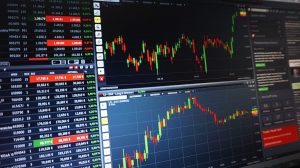 The foreign exchange market (FX) is one of the most accessible and lucrative investment options available in Nigeria. Many financial institutions and private investors operate in the market, and conduct these transactions electronically in fractions of a second. The CBN has issued numerous guidelines to facilitate FX operations in Nigeria. These guidelines aim to brace the foreign exchange market and stimulate inter-bank trade. If you have some spare cash and would like to get started in currency trading in Nigeria, then read on.
The foreign exchange market (FX) is one of the most accessible and lucrative investment options available in Nigeria. Many financial institutions and private investors operate in the market, and conduct these transactions electronically in fractions of a second. The CBN has issued numerous guidelines to facilitate FX operations in Nigeria. These guidelines aim to brace the foreign exchange market and stimulate inter-bank trade. If you have some spare cash and would like to get started in currency trading in Nigeria, then read on.
There are two types of Forex charts: line charts and bar charts. The line chart displays the price of a currency over a specified period of time. Trend lines indicate whether a currency is going to break out or move in a specific direction. Traders in Nigeria often use line charts as a starting point for analysis. Bar charts, on the other hand, show price movements on different time frames, and are more straightforward and can easily identify a buyer’s or seller’s market.
The forex market in Nigeria is open seven days a week, from Sunday evening to Friday morning. However, most major financial centers are open twenty-four hours a day. Because currency prices change often, it is important to understand the different types of analysis and how to make the right trades at the right time. When to buy a currency, and when to sell it, you should always remember to invest in currency pairs that have strong support from other currencies.
The central bank and the Bureau de Change association will discuss a new policy for currency trading in Nigeria on Tuesday. The association aims to resolve the multiplicity of exchange rates, increase liquidity, and attract foreign investors. Retail operators typically account for only 5 percent of total foreign currency trading in Nigeria. However, with the introduction of the new policy, retail operators have been forced to buy dollars from licensed bureaux de change. Licensed bureaux de change source dollars from private sources and resell them at a higher margin.
A fundamental analysis involves analyzing all available data and economic factors to determine how a currency will move. A technical analysis is based on price charts and indicators. Traders in Nigeria that use technical analysis rely on past price movements to predict future ones. This method requires extensive knowledge of technical analysis and the underlying principles of the market. This method is the most complex and risky form of currency trading in Nigeria, but is the preferred method by many.
Many Nigerians buy and sell currency with their smartphones. The CBN’s actions have forced thousands of people into the unemployment market and shut down many businesses. Fortunately, however, the cryptocurrency market is thriving in Nigeria, and it is possible to trade on the go, thanks to the proliferation of smartphone apps. The ability to buy and sell currencies anywhere, anytime, from any location, is a big plus in today’s busy world.
